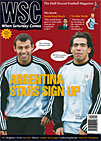 Tranmere's Gavin Ward's celebrated 80-yard goal against Orient leaves just another 63 to go to match the current king of goalscoring keepers, as Robert Shaw reports from Brazil
Tranmere's Gavin Ward's celebrated 80-yard goal against Orient leaves just another 63 to go to match the current king of goalscoring keepers, as Robert Shaw reports from Brazil
Liverpool fans may recall the São Paulo goalkeeper’s heroics in Tokyo last December, but the truly distinctive aspect of Rogerio Ceni is the havoc he wreaks at the other end. When Ceni’s delicately clipped free-kick and penalty salvaged a 2-2 draw for São Paulo against Cruzeiro on August 20, he set a world-record scoring tally for a keeper of 64 goals, two ahead of the Paraguayan José Luis Chilavert.
Remarkably, 42 of the goals have been free-kicks – only Ronaldinho, then at Gremio, surpassed Ceni’s dead-ball strike rate in the 2000 national championship (Ceni converted seven to Ronaldinho’s ten). He reckons to score from 70 per cent of the 50 or 60 free-kicks he takes at each training session. Only one coach at São Paulo, his club since 1990, asked Ceni to concentrate solely on his goalkeeping. Mario Sergio argued it was a distraction, but has since admitted he wasted Ceni’s talent. The drill is now well rehearsed, but has gone horribly wrong in the past. Playing against Fluminense, Ceni netted a free-kick but, as he celebrated his goal, Flu restarted quickly and scored from within the centre circle, with the keeper still clapping himself en route back to his unmanned post.
A one-club man in a country where the incessant trading of players leads to high squad turnover, Ceni should play his 700th first-team match before the season ends in December. He is the only goalkeeper to feature among Brazil’s longest-serving players – former Vasco da Gama striker Roberto Dinamita holds the record with 1,065 games – and almost all the others played at a time when going abroad was not the ready option it is today.
A supposed offer from Arsenal did trigger a 28-day suspension back in 2001, after Ceni rowed with club president Paulo Amaral over not being released from his contract. The story resurfaced last month when a Brazilian TV journalist alleged that Ceni had forged a signature in connection with the Arsenal deal in order to lever a wage rise from São Paulo. An enraged Ceni phoned the live sports show, berated the journalist on air and threatened legal action.
Although he was included in Brazil’s 2006 World Cup squad, Ceni has been given few opportunities at international level, which some pundits put down to a feud with former national coach Mario Zagallo. The latter was annoyed by the keeper’s resistance to “team bonding” at the 1997 Confederations Cup in Saudi Arabia when a group of players invaded team-mates’ rooms and shaved parts of their head. “If I had been in Brazil I would have packed and left immediately. If that’s what they call team spirit then I don’t have it,” Ceni said later. Perceived arrogance may also have affected his chances. In 1999, when two schoolboy howlers gifted Barcelona a 2-2 draw against Brazil, Ceni commented: “If I’d not conceded those goals it would have been regarded as one of the best performances by a Brazilian goalkeeper in recent times.” A crucial penalty save in this year’s Libertadores semi-final was followed by another blunder in the away leg of the all-Brazilian final against Internacional when a regulation cross was spilled at the feet of Inter’s grateful strikers. Sensitive to criticism, Ceni has responded that he “can’t accept being evaluated by journalists who can barely control a football”.
Ceni’s transformation into the “face of São Paulo” has not been entirely smooth. After moving from a small provincial club as a teenager, he had to wait until 1997 before finally establishing himself as first-choice. Some accuse him of being too wrapped up in personal marketing to be a great keeper – he has promoted personalised football shirts that show him flying a plane or driving a lorry as part of his image as São Paulo’s superhero. None the less, his loyalty during a turbulent time in the club’s history, when they went a decade without a major national trophy, has secured his position as a fans’ idol. Many now see him as a future club president. In Brazil that’s a role usually filled by what might be politely described as eccentrics and he seems to have all the right attributes.
From WSC 236 October 2006. What was happening this month